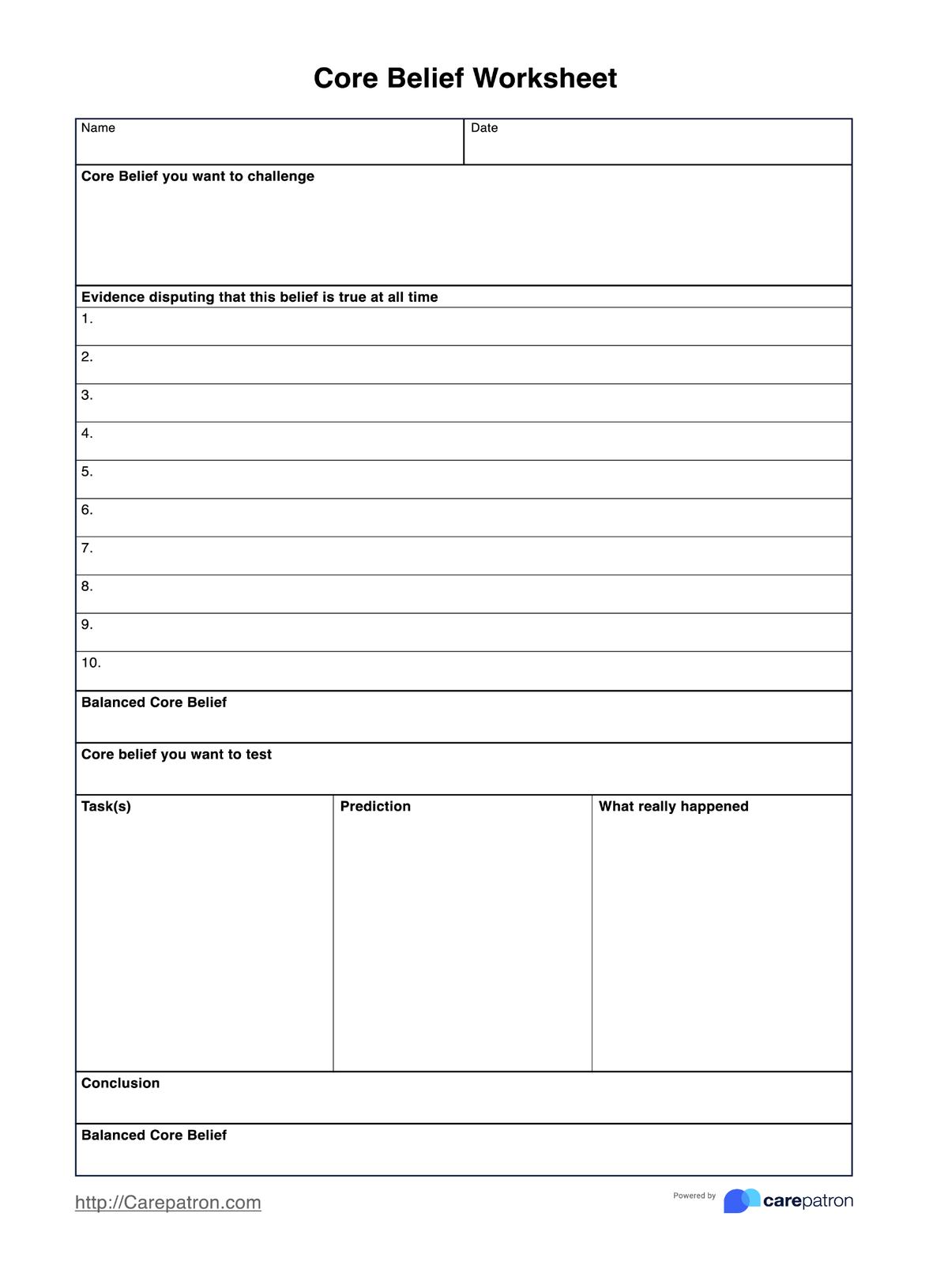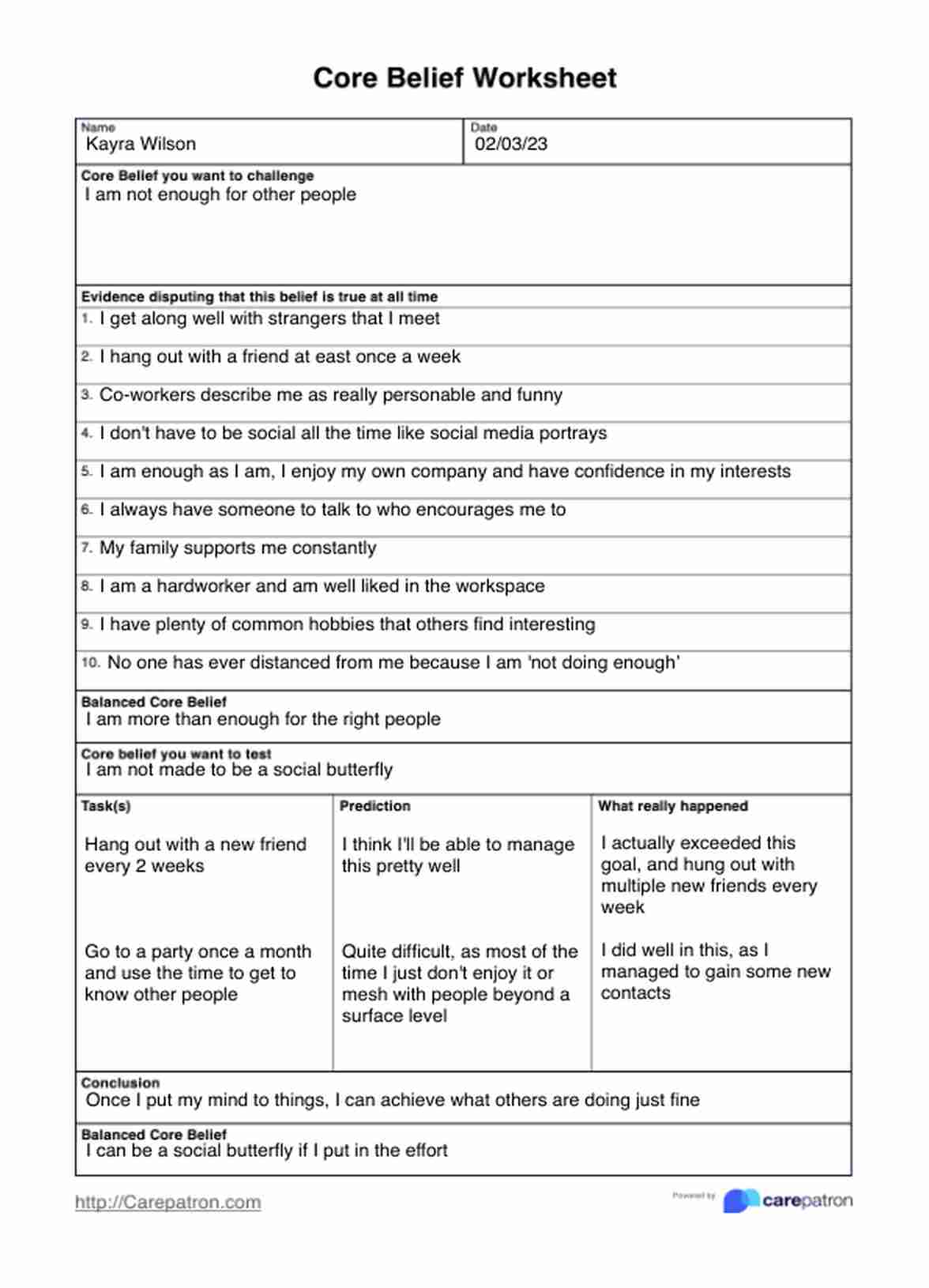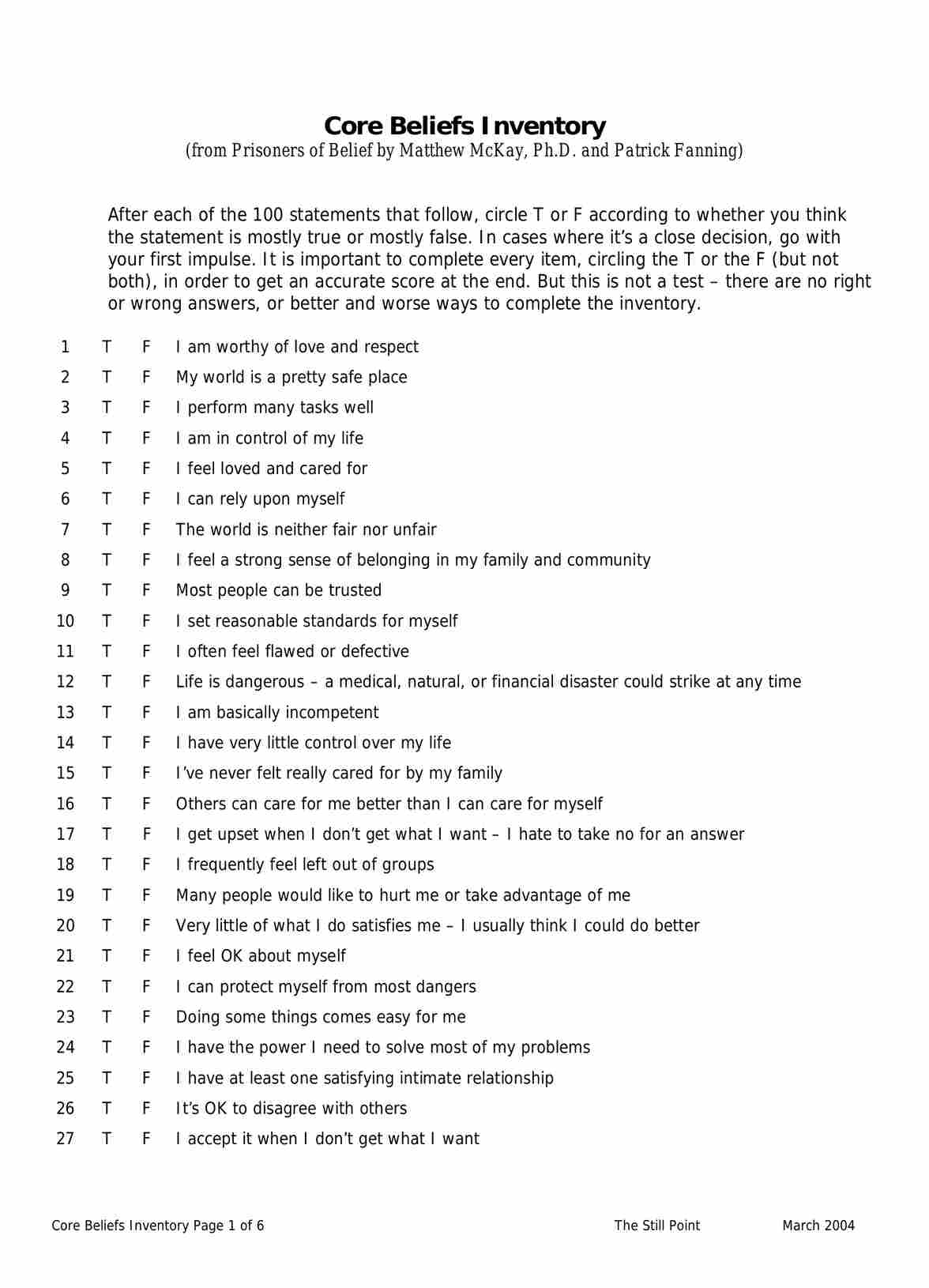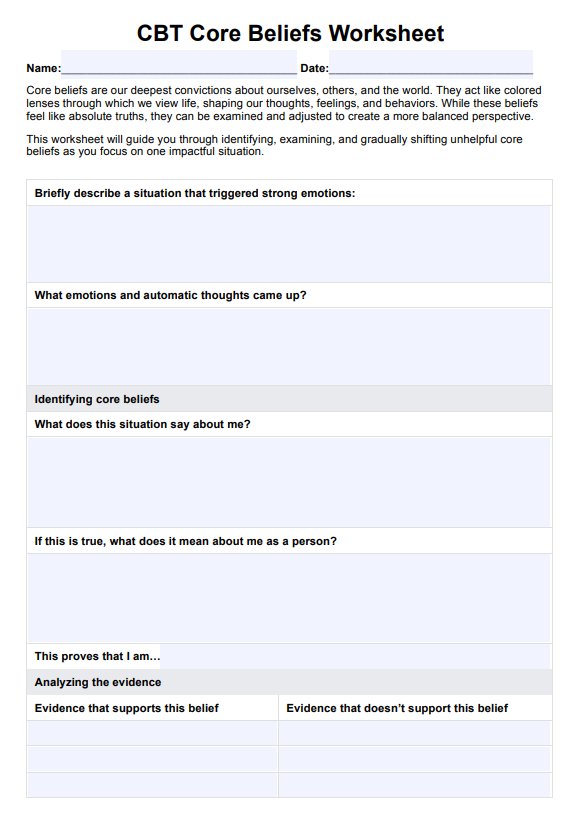Core Beliefs Worksheets
Transform automatic negative thoughts with our Core Beliefs Worksheet. Help clients challenge underlying core beliefs and achieve a fulfilling life.


What is a core belief?
A core belief is a fundamental idea or perception that shapes how we see ourselves, others, and the world. People develop core beliefs based on experiences, particularly those formed early in life. These beliefs can be positive, fostering self-confidence and optimism, or negative, leading to unhelpful core beliefs and negative thinking. For instance, if someone faced criticism often as a child, they might develop a harmful core belief that they are not good enough.
Challenging core beliefs is crucial for personal growth and self-awareness. In cognitive restructuring and therapeutic approaches, challenging core beliefs is a key part of the process. By recognizing and questioning these deep-seated beliefs, individuals can replace them with more positive beliefs. This process helps to overcome core fears and reduce the influence of unhelpful core beliefs.
It's essential to continually assess and adjust an individual's core beliefs to lead a more fulfilling life. Transforming harmful core beliefs into supportive ones encourages a healthier mindset and better emotional well-being.
Core Beliefs Worksheets Template
Core Beliefs Worksheets Example
What is a Core Beliefs Worksheet?
The Core Beliefs Worksheet is a powerful therapeutic tool that guides clients in evaluating their deeply held beliefs about themselves, others, and their environment. This worksheet delves into clients' underlying assumptions, thoughts, and negative core beliefs, providing insight into their mindset, decision-making processes, and aspirations. In cognitive therapy, the Core Beliefs Worksheet aids clients in identifying and challenging harmful beliefs.
Utilizing such a worksheet offers valuable insights into clients' personal growth and development. It facilitates the exploration and transformation of core beliefs that impact confidence, self-awareness, resilience, and overall well-being. By following the prompts, clients can pinpoint beliefs that foster productivity and achieve meaningful outcomes aligned with their values. Additionally, mental health professionals may find our core beliefs worksheet template and beliefs list template that focuses on CBT particularly useful in guiding clients through this process effectively.
How to use this Core Beliefs Worksheet?
The worksheet is elementary and straightforward, allowing clients to develop practical skills when honing their core beliefs. All you have to do is follow these three steps!
Step 1: Download the worksheet
Click the links on our page to download the Core Beliefs Worksheet, which should open automatically on your preferred device. You can start editing the worksheet as you please or print it out to prepare for your appointment with your client. It's free and only takes a couple of seconds.
Step 2: Distribute the worksheet to your client
Next, you'll need to hand the worksheet to your client to complete. It is up to you whether this is met during your appointment, which is what we recommend to extract the highest value. Or you can forward the PDF to your client to accomplish it on their own time. to do is answer the questions and prompts listed on the worksheet.
Step 3: Store the document securely
Once the worksheet is completed in full, you must store it securely. Client confidentiality is one of the most critical aspects of healthcare, and this is no exception. Most clients will take the worksheet home; however, if you prefer to keep the worksheet as part of your notes, then make sure to store it on a HIPAA-compliant server. This is a great way to safeguard patient information and ensure only authorized users access it.
Other useful resources for managing core beliefs
In addition to therapy and worksheets like the Core Beliefs Worksheet, numerous resources are available for managing core beliefs. These resources can provide additional support and guidance for both healthcare professionals and their patients:
- Books on cognitive behavioral therapy: Books aligned with cognitive behavior therapy principles, like "Feeling Good: The New Mood Therapy" by David D. Burns, offer insights into understanding and changing negative thought patterns. Publications from Guilford Press offer a range of books and resources on cognitive therapy and managing core beliefs, providing valuable information for professionals and clients.
- Mindfulness and meditation apps: Apps like Headspace or Calm provide guided meditation and mindfulness exercises, which can help develop self-awareness and challenge negative beliefs.
- Online courses and workshops: Platforms like Coursera or Udemy offer courses on topics like CBT, mindfulness, and personal development, which can be beneficial for understanding and managing core beliefs.
- Support groups: Joining support groups, whether in-person or online, can provide a sense of community and shared learning. Hearing how others manage their core beliefs can be inspiring and informative.
- Therapeutic journals: Journals designed for therapy, with prompts and exercises, can aid in ongoing self-reflection and belief challenging.
- YouTube channels: Educational channels focused on mental health and psychology can provide valuable information and techniques for managing core beliefs.
- Podcasts on mental health: Podcasts are a great way to gain insights into mental health challenges and solutions while on the go.
Combining these resources can enhance the work done in therapy sessions, providing a more holistic approach to managing core beliefs and mental health.
Commonly asked questions
Yes, these worksheets can be easily customized to fit the needs of your clients and therapy sessions. You can tailor the prompts and questions to specifically address the core beliefs that your clients are struggling with. Additionally, you can use different versions of this worksheet to target other areas of life, such as relationships, career, self-esteem, etc.
The frequency of using a Core Belief Worksheet may vary depending on your client's needs and progress. Some clients may benefit from completing these worksheets once a week, while others may need to do them more frequently. It is important to regularly reassess and adjust the frequency based on the client's progress.
It can be introduced at any point during therapy. However, it may be most effective after establishing a solid therapeutic relationship and understanding the client's current challenges and goals. This will allow for a more targeted approach to addressing specific core beliefs hindering the client's progress.





















-template.jpg)























































































